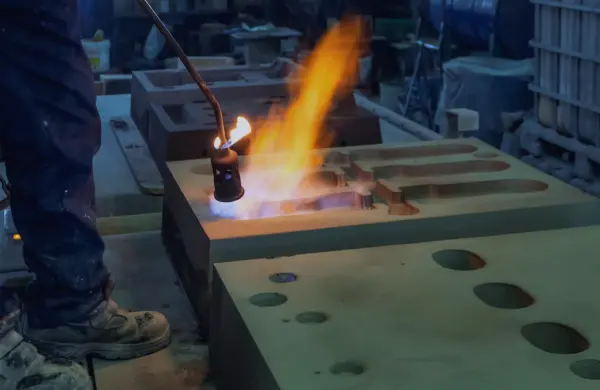What Does Alcast Company Do?
What Does Alcast Company Do?
Blog Article
The smart Trick of Alcast Company That Nobody is Discussing
Table of ContentsAbout Alcast CompanyAlcast Company Can Be Fun For AnyoneThe Ultimate Guide To Alcast CompanyAlcast Company Fundamentals ExplainedThe Only Guide for Alcast CompanyThe Single Strategy To Use For Alcast Company
The subtle distinction hinges on the chemical material. Chemical Contrast of Cast Aluminum Alloys Silicon promotes castability by minimizing the alloy's melting temperature and improving fluidity throughout casting. It plays a vital duty in enabling detailed mold and mildews to be loaded accurately. Furthermore, silicon adds to the alloy's toughness and use resistance, making it beneficial in applications where resilience is vital, such as automotive components and engine parts.It likewise enhances the machinability of the alloy, making it easier to process right into completed products. In this means, iron adds to the overall workability of light weight aluminum alloys.
Manganese adds to the stamina of aluminum alloys and boosts workability (aluminum casting company). It is typically used in functioned light weight aluminum products like sheets, extrusions, and accounts. The presence of manganese help in the alloy's formability and resistance to splitting during manufacture procedures. Magnesium is a lightweight component that supplies strength and influence resistance to aluminum alloys.
Some Known Facts About Alcast Company.
It allows the manufacturing of light-weight elements with outstanding mechanical buildings. Zinc enhances the castability of aluminum alloys and assists control the solidification procedure throughout spreading. It improves the alloy's stamina and firmness. It is usually located in applications where complex forms and great information are required, such as attractive spreadings and specific vehicle components.

The key thermal conductivity, tensile stamina, yield toughness, and prolongation vary. Amongst the above alloys, A356 has the highest possible thermal conductivity, and A380 and ADC12 have the most affordable.
Everything about Alcast Company

In precision spreading, 6063 is well-suited for applications where complex geometries and top quality surface area finishes are extremely important. Examples include telecommunication enclosures, where the alloy's exceptional formability permits for sleek and cosmetically pleasing designs while preserving architectural integrity. In a similar way, in the Illumination Solutions market, precision-cast 6063 components produce sophisticated and efficient lights fixtures that need complex forms and good thermal performance.
It brings about a better surface finish and much better rust resistance in A360. The A360 displays remarkable prolongation, making it perfect for complicated and thin-walled elements. In accuracy spreading applications, A360 is fit for sectors such as Consumer Electronic Devices, Telecommunication, and Power Devices. Its improved fluidity enables detailed, high-precision parts like smart device coverings and interaction tool real estates.
The Definitive Guide to Alcast Company
Its distinct residential properties make A360 a valuable option for precision spreading in these industries, improving item sturdiness and quality. Aluminum alloy 380, or A380, is an extensively used spreading alloy with numerous distinct attributes. It supplies outstanding castability, making it an optimal selection for accuracy casting. A380 shows great fluidness when molten, making certain intricate and in-depth mold and mildews are properly reproduced.
In accuracy casting, aluminum 413 shines in the Customer Electronics and Power Tools sectors. This alloy's premium deterioration resistance makes it an exceptional option for outside applications, guaranteeing long-lasting, long lasting products in the stated markets.
Alcast Company Fundamentals Explained
Once you have actually chosen that the light weight aluminum die casting process appropriates for your project, an essential next step is making a decision on the most suitable alloy. The light weight aluminum alloy you select will significantly influence both the spreading process and the residential or commercial properties of the last item. As a result of this, you need to make your choice carefully and take an educated approach.
Determining the most appropriate light weight aluminum alloy for your application will certainly indicate considering a vast selection of qualities. These comparative alloy qualities follow the North American Pass Away Spreading Organization's guidelines, and we've divided them right into 2 groups. The initial group addresses alloy features that influence the manufacturing procedure. The 2nd covers attributes impacting the properties of the final item.
Alcast Company Things To Know Before You Buy
The alloy you choose for die casting straight affects a number of aspects of the casting go to this website procedure, like exactly how very easy the alloy is to collaborate with and if it is susceptible to casting issues. Hot cracking, additionally referred to as solidification cracking, is a normal die casting issue for light weight aluminum alloys that can result in interior or surface-level rips or splits.
Particular light weight aluminum alloys are much more at risk to warm cracking than others, and your selection needs to consider this. One more typical issue found in the die spreading of light weight aluminum is die soldering, which is when the cast sticks to the die walls and makes ejection difficult. It can harm both the actors and the die, so you ought to search for alloys with high anti-soldering homes.
Corrosion resistance, which is already a remarkable characteristic of light weight aluminum, can differ substantially from alloy to alloy and is an important characteristic to consider depending upon the environmental problems your product will be exposed to (Casting Foundry). Wear resistance is one more residential or commercial property typically sought in aluminum products and can distinguish some alloys
Report this page